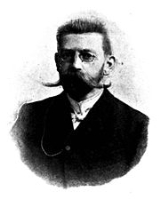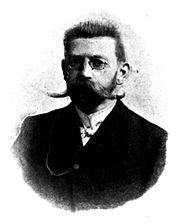
Paul Grawitz
Encyclopedia

Grawitz
Grawitz is the surname of:* Ernst-Robert Grawitz, Nazi physician* Paul Grawitz, physician who identified the Grawitz tumour....
(born October 1, 1850, Zerrin/Sierzno
Sierzno
Sierzno is a village in the administrative district of Gmina Bytów, within Bytów County, Pomeranian Voivodeship, in northern Poland. It lies approximately south-west of Bytów and west of the regional capital Gdańsk.The village has a population of 153....
, Kreis Bütow (cf.Bütow
Bütow
Bütow is a municipality in the Mecklenburgische Seenplatte district, in Mecklenburg-Vorpommern, Germany....
/Bytów
Bytów
Bytów is a town in the Middle Pomerania region of northern Poland in the Bytów Lakeland with 16,888 inhabitants . Previously in Słupsk Voivodeship , it is the capital of Bytów County in Pomeranian Voivodeship .-History:...
), Pommern (now Poland
Poland
Poland , officially the Republic of Poland , is a country in Central Europe bordered by Germany to the west; the Czech Republic and Slovakia to the south; Ukraine, Belarus and Lithuania to the east; and the Baltic Sea and Kaliningrad Oblast, a Russian exclave, to the north...
) - June 27, 1932, Greifswald
Greifswald
Greifswald , officially, the University and Hanseatic City of Greifswald is a town in northeastern Germany. It is situated in the state of Mecklenburg-Vorpommern, at an equal distance of about from Germany's two largest cities, Berlin and Hamburg. The town borders the Baltic Sea, and is crossed...
) was a German
Germany
Germany , officially the Federal Republic of Germany , is a federal parliamentary republic in Europe. The country consists of 16 states while the capital and largest city is Berlin. Germany covers an area of 357,021 km2 and has a largely temperate seasonal climate...
pathologist. While he studied medicine at the University of Berlin, he was an assistant to pathologist Rudolf Ludwig Karl Virchow (1821-1902). After graduation he continued as assistant to Virchow until 1886. Grawitz was father-in-law to pathologist Otto Busse
Otto Busse
Otto Emil Franz Ulrich Busse was a German pathologist. Busse was born in Belgard, Pomerania, Prussia and studied medicine at the University of Greifswald, and subsequently became an assistant to Paul Grawitz , at Greifswald...
(1867-1922).
He taught as a professor
Professor
A professor is a scholarly teacher; the precise meaning of the term varies by country. Literally, professor derives from Latin as a "person who professes" being usually an expert in arts or sciences; a teacher of high rank...
at the University of Greifswald from 1886 until 1921, and was director of the Pathological Institute there. He is known for his pioneer work with tissue culture
Tissue culture
Tissue culture is the growth of tissues or cells separate from the organism. This is typically facilitated via use of a liquid, semi-solid, or solid growth medium, such as broth or agar...
s, and his experimentation in the field of bacteriology
Bacteriology
Bacteriology is the study of bacteria. This subdivision of microbiology involves the identification, classification, and characterization of bacterial species...
. Grawitz' tumour, also known as renal cell carcinoma
Renal cell carcinoma
Renal cell carcinoma is a kidney cancer that originates in the lining of the proximal convoluted tubule, the very small tubes in the kidney that filter the blood and remove waste products. RCC is the most common type of kidney cancer in adults, responsible for approximately 80% of cases...
is named after him.
See also
- Grawitzsche Geschwulst (Grawitz tumo(u)r, nephrocellular carcinoma), see Renal cell carcinomaRenal cell carcinomaRenal cell carcinoma is a kidney cancer that originates in the lining of the proximal convoluted tubule, the very small tubes in the kidney that filter the blood and remove waste products. RCC is the most common type of kidney cancer in adults, responsible for approximately 80% of cases...
- University of Greifswald

